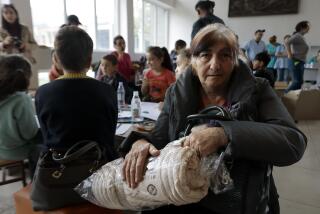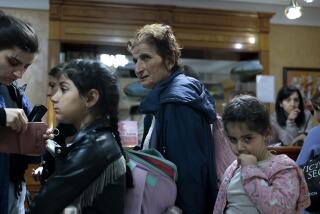Some Kurds Go Home--Others Refuse : Iraq: About 1,000 refugees leave Turkish camp, U.S. officers say.
- Share via
ISIKVEREN, Turkey — Hundreds of Kurdish refugees headed home to Iraq from this squalid mountaintop camp Tuesday at the start of what U.S. military officers hope will be a mass refugee return to the country they fled in fear and panic just a month ago.
Not all the refugees are convinced that U.S. and allied security will guarantee them long-term protection from Iraqi President Saddam Hussein, and a substantial minority still declare that they will never go down to the haven area set up for them in northern Iraq.
“What happens when the allies go in a month or two? We didn’t come here in the cold, the rain, the filth, with our children and old people dying, just to go back under the heel of Saddam,” said Ahmed Mustafa, leader of the 10,000-strong Shirnakhi clan from near the Iraqi border town of Zakhu.
Mustafa and his tribal elders at the Isikveren camp said they want a U.N.-protected independent state of Kurdistan, something no Western or Middle East government will allow--and an ideal for which some people in the camp are apparently not prepared to wait.
U.S. officers who organized the two-day trek over the mountains to Zakhu, where coalition forces are building a big tent city, said more than 1,000 refugees are believed to have left Isikveren on Tuesday.
In Diyarbakir, regional capital of southeastern Turkey, Col. John Petrella, a civil affairs officer coordinating relief efforts, said, “They will soon beat a wide path down. I expect a mass exodus.”
Even clan leader Mustafa said he sent 50 men to help build the Zakhu camp, and other tribal leaders said they expect to start down the mountain soon.
“We want to go very soon. Things are very bad here,” declared Said Jihanger, responsible for 700 members of the Zebari clan. “The main problem is that we are not strong enough to go on foot.”
Nevertheless, conditions in the camp, home for about 80,000, have improved dramatically in the past month. The sun has dried the mud, the mortality rate has fallen and food supplies are no longer a problem, said John Telford, who represents the Office of the U.N. High Commissioner for Refugees. Sacks of potatoes, tent material and bottled water line the steep track up to the camp, although refugees still descend furiously on every truck that arrives with relief supplies.
Refugees have at last started to screen off latrines, and even the price of cigarettes sold by refugee boys has halved in the past week.
“We still have an urgent need to provide clean water and sanitation, but it’s much better than it was,” Telford said. “I’d like to say we were on top of the situation, but it’s still very fragile.”
Dr. Cornaro Sandro, of the French-based group Doctors Without Borders, sat dejectedly outside a hospital tent where three children died Monday and said that although things are better, he felt he is still losing the race.
“There are no high-risk infectious diseases yet, but there is diarrhea, diarrhea, diarrhea,” Sandro said.
Recent Turkish official figures show that between April 6 and April 27, nearly 3,000 people died among the nearly half a million refugees penned up on the Iraqi border. Nine hundred of the dead counted in Turkey were children under age 6 at Isikveren.
Refugees said that about a quarter to a third of their number will not go back, some of them Kurdish radicals and some of them Christians who are pleading to be allowed political refugee status in the West.
“We’re living, and the food is fine. But Baghdad knows all about me,” said Adel, 23, a Christian dissident from Baghdad who said he had escaped from prison when Kurdish rebels liberated his jail during their monthlong uprising.
Adel showed scars on his feet where his Iraqi jailers had tortured him and added: “The Kurds will get their rights and go back home. But what about us?”
More to Read
Sign up for Essential California
The most important California stories and recommendations in your inbox every morning.
You may occasionally receive promotional content from the Los Angeles Times.












